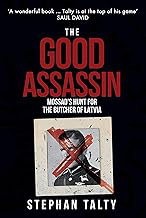The Good Assassin: How a Mossad Agent and a Band of Survivors Hunted Down the Butcher of Latvia by Stephen Talty; Houghton Mifflin Harcourt, (c) 2020
By Dorothea Shefer-Vanson

 MEVASSERET ZION, Israel — This book by Stephen Talty consists of three sections. The first includes a vivid account of Jewish life in pre-war Latvia, the exploits of pioneer-aviator Herbert Cukurs, the Russian occupation of the country followed by the German invasion with the round-up and brutal murder of the Jewish population (this part should not be read by the faint-hearted), with the eager participation of the local population, including national hero Herbert Cukurs.
MEVASSERET ZION, Israel — This book by Stephen Talty consists of three sections. The first includes a vivid account of Jewish life in pre-war Latvia, the exploits of pioneer-aviator Herbert Cukurs, the Russian occupation of the country followed by the German invasion with the round-up and brutal murder of the Jewish population (this part should not be read by the faint-hearted), with the eager participation of the local population, including national hero Herbert Cukurs.
.
The second section contains a detailed and graphic description of the process many years later by which a Mossad agent gained the friendship and trust of Herbert Cukurs, who by then was living quietly in Brazil’s principal city, Rio de Janeiro, and managed to organize his assassination by a team of Mossad agents. Coming only a few years after the capture in Argentina of Adolf Eichmann and his trial and execution in Israel, it seems strange that Cukurs was not more circumspect about concealing his identity. The success of the operation can be explained by the ability of the Mossad agent to conceal his true identity and present himself as an innocuous Austrian businessman.
The third section describes the process by which the efforts of several groups, particularly Nazi-hunters Tuviah Friedman and Simon Wiesenthal, succeeded in blocking the legislation proposed by the West German Republic in 1965 to impose a statute of limitations on the prosecution of Nazi war criminals.
The author has done extensive research into every aspect of his three narratives, including a detailed index and several pages of notes at the end. He has interviewed many individuals, including some of the few Jewish survivors of the mass murders in and around Riga, Latvia’s capital city, and has studied documentary evidence recorded by them and others. He provides an astonishing and detailed account of the way in which a young Jewish woman was saved by a local resident who had fallen in love with her.
The vicissitudes each of them suffered subsequently, whether individually or jointly, under Soviet rule, are harrowing to read. The knowledge that the young woman was able later to marry a Jewish man, bear two daughters, and eventually move to Israel provides the reader with some consolation.
The author must have had privileged access to Mossad documents and/or agents to be able to describe in such great detail precisely how the agent managed to gain Cukurs’ confidence to such an extent that, although suspicious of being traced by hostile Jewish elements, he agreed to fly to Montevideo in Uruguay, where the Mossad considered the conditions for assassinating him would be more favorable.
Finally, the author gives a detailed account of how the German legislation was proposed, the way Israel’s government rallied in order to prevent its ratification by the Bundestag, and the contribution made by the concerted efforts of Friedman and Wiesenthal. All these elements together achieved the objective of defeating the proposal on repeated occasions.
As a result of the blocking of the legislation, Germany’s prosecution team was considerably expanded, and many more Nazi criminals were brought to trial and imprisoned for varying periods of time. Furthermore, as a result of the assassination of Cukurs many former Nazis living in relative security in South America came to feel less secure, fearing that they would suffer a similar fate. Whether more assassinations were implemented is not clear. To answer that would require another well-written book based on intimate knowledge and extensive research.
*
Dorothea Shefer-Vanson is an author and freelance writer residing in the Jerusalem suburb of Mevasseret Zion.